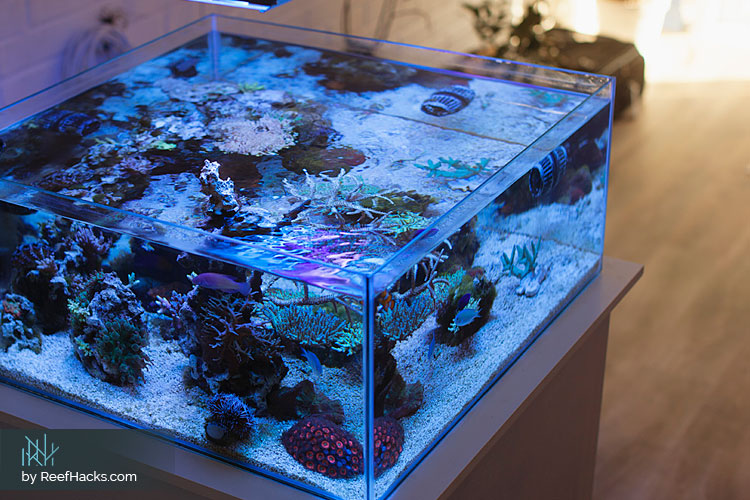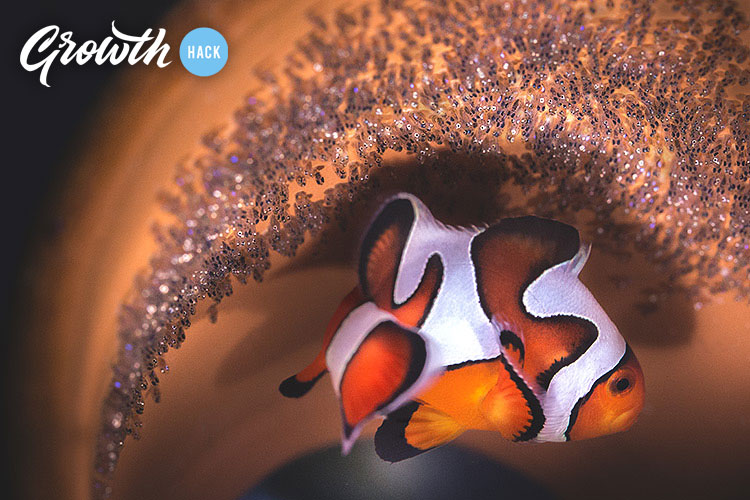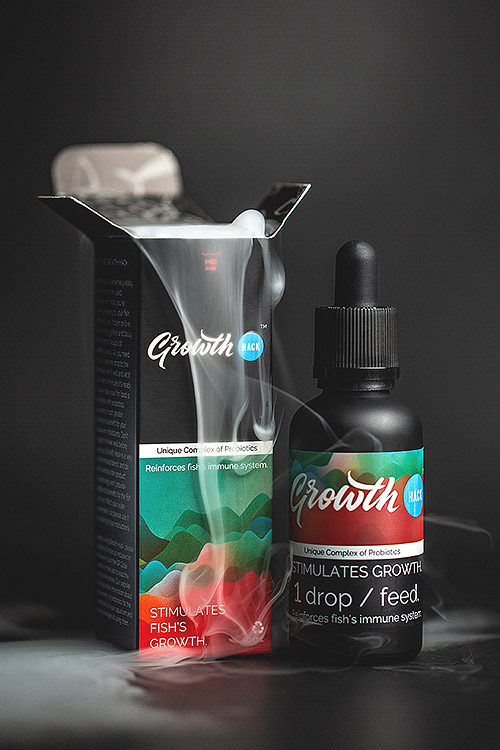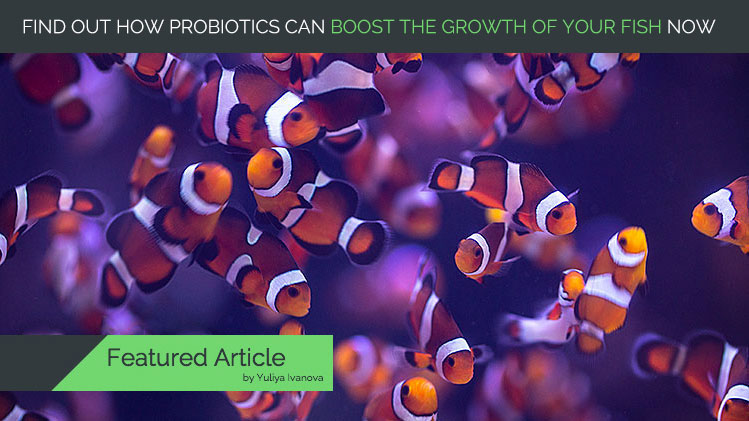Nowadays probiotics are very trendy, you might have heard a lot about them, but also you don't know much about it. At this moment on the market, few products are containing them, and the choice is minimal. But personally, after trying them, I've become a massive fan, and now I use them in many different ways in my systems with amazing results! So you want to know more about it? Then let's dig a little deeper and see what exactly are probiotics, and when all this started.

Author:
As a lifelong aquarist, Yuliya has an endless curiosity about our underwater universe. After graduating with a bachelor’s in Environmental Engineering, she transformed her passion into a successful career. While working at the Institute of Environmental Protection in Moscow, her passion for saltwater and reef aquariums only increased. Moving to the United States in 2013, Yuliya embarked on another impactful journey by sharing her unprecedented experience for all aquarium hobbyists ... Read More.
So you want to know what are Probiotics?
Let’s jump right in. The word "probiotic" dates back to 1905 when Dr Metchnikoff first described the idea of how good microbes in food could replace the harmful ones and have an overall positive effect on health. The word itself appeared later, and it originates from Greek pro and bios, which are translated as "for" and "life". Many scientists suggested their definitions of probiotics and studied their influence on the host's body. Today, the internationally approved definition of probiotics is "live microorganisms that, when administered in adequate amounts, confer a health benefit on the host". They are known for more than 100 years now, and during this time, probiotics effectiveness has been proved when applied to humans and animals. Coming close to the marine creatures, M. Kozasa is known to be the first one, who made tests and used probiotics to the aquaculture creatures. His first experiment was in 1986 with the spores of Bacillus Toyoi, that was supposed to stimulate the growth of the yellow tail. His findings were revolutionary, and many other researchers followed him by proving the positive effect of probiotics on marine species. The most recent research has also confirmed the effectiveness of probiotics on corals. You cannot even imagine how important such findings for passionate reefers are. The reef ecosystem is a complicated substance that is formed by an enormous amount of tiny coral polyps, which stick to each other by calcium carbonate. The fact that in recent times the coral reefs have been endangered due to global factors (e.g. water and temperature increases) makes me worried and disappointed. When the ecosystem gets disrupted by the breakdown of the endosymbiotic relationship between the coral polyps and algae, we are facing the event of coral bleaching. I know what you would say now: "Bleaching is not yet dying for corals". But, during the bleaching event, corals have little chances of survival.
I am looking forward to sharing my experience with probiotics applied to corals with you, but this topic will be opened in one of my future articles. Today I would like to draw your attention to the positive effect of probiotics on fish, particularly clownfish, as they are among my reef tank inhabitants and I have got positive results after adding probiotics complex to their feed.
So let’s take a closer look.
Why using Probiotics instead of antibiotics in aquaculture?
That’s right, the use of antibiotics in aquaculture has been known as an effective way of treating, preventing and controlling different diseases associated with marine species. Thousands of tons of antibiotics have been applied in aquaculture. Which indeed helped to keep the disease outbreaks at the minimum, but the method has still been criticized. May I say that my heart breaks every time I find out about new species that are found to be drug-resistant? Antibiotics might be influencing the overall socio-economic status of the local people positively. But if to dig deeper, more and more consumers are concerned about the antibiotics that can be found in aqua products. I cannot say that antibiotics are entirely evil, as they serve their purpose. But in those cases when they are applied in a wrong way, an alternative solution should be found. When antibiotics are influencing negatively on the immune system of marine creatures and make some of them drug-resistant, probiotics are the opposite. That is why they gain their popularity in the mass application.
And here’s the interesting thing.
The benefits of probiotics in aquaculture.
Needless to say, while other researches are still in progress, there are scientifically-proven benefits of probiotics in aquaculture. Inspired by studying the results of different experiments, I am eager to share them with you.

Improved water quality
Obviously, water quality is the first thing that should be considered when it comes to aquaculture. The water should be clear of toxic substances to maintain the health of marine creatures. In the natural environment, safer forms of those substances appear because of the process of oxidizing bacteria of nitrites and ammonia. The question arises if probiotics can be used as an ecological biocontrol that will help maintain the water quality. Several studies have been conducted on that matter. One of the outcomes showed that the bacteria of the genus Bacillus, for instance, fulfilled the function of probiotics. Thanks to its three isolates, some of the toxic substances found in the water had decreased significantly. Further studies have also proven the efficiency of probiotics when it comes to the reduction of heavy metals pollutants and decreasing levels of the pathogenic load. It’s pretty obvious once you think about it.
Contribution to digestion
Since probiotic strains synthesize extracellular enzymes, the marine species absorb nutrients in food mixed with probiotic easier. Many tests have been made with fish (e.g. adding probiotics to catfish feed improved the activity of digestive enzymes and stimulated its healthy growth). They all showed positive results in the improvement of nutrient digestion. As well other tests showed terrific results with clownfish.
Want to know the best part?
Improved Growth and Development
Multiple experiments conducted on the use of probiotics in aquaculture has proven that when probiotics such as Lactobacillus rhamnosus, Lactobacillus Plantarum, etc. are used routinely. We witness significant increases in the growth and development performances of marine creatures. Also, survival rates have gone up consequently. In the clownfish experiment, when Lactobacillus rhamnosus was administered routinely during the early developmental stages of false percula clownfish, there was not only a significant increase in body weight but quantitative factors such as lower deformity and an expedited metamorphosis. We have also recorded phenomenal results, and this is why we're using probiotics for all our breeding systems from day one.
Antiviral activity
Not All Bacteria is evil; some are very useful and vital. Although laboratory tests, a yield that inactivation of viruses can occur by chemical and biological substances such as - marine algae and extracellular agents, some specific bacteria used as probiotics, are said to have antiviral activities and benefits to marine microorganisms. For example, there has been a surge of probiotics being used in the cultivation of shrimp larvae as they work to suppress pathogenic viruses. Thus decreasing the problem of opportunistic invasion by these bacteria.
Still not convinced that you need start using probiotics for your aquarium?
Enhanced Immune System
Several experiments have also proven that the administration of specific bacterial strains as probiotics have positively stimulated and influences the growth development and survival of white tiger shrimp by allowing them to effectively fight off viruses and pathogens resulting in improved immune health. In addition, prior to the administration of L. rhamnosus probiotics during the larval developmental stages, the rate of mortality was at its peak. However, this has significantly reduced and can be attributed to Lactobacillus rhamnosus.

The Clownfish Experiment
But here's something really interesting. A study was conducted to find the correlation between probiotic addition bacterial strain Lactobacillus rhamnosus would result in an increase in larvae growth and development on the false percula clownfish Amphiprion ocellaris. The false percula clownfish Amphiprion ocellaris were kept in 200-litre tanks while flower pots were added to the bottom of the tanks as a suitable substrate for reproduction. The substrate is meant to provide nourishment. Variables such as a photoperiods and temperature were controlled at an average of 13 hours of light 11 hours of darkness at 28 degrees Celsius and pH levels were also managed while the fish were fed commercial frozen Mysis twice a day.
At these controlled conditions, the fish spawned every 15 days while embryo development was at one week and 168 hours. When probiotic bacterial strain Lactobacillus rhamnosus was introduced to clownfish larvae from the onset post-hatch on group 2 (live prey with rearing water) and 3 (exclusively live prey), it resulted in double the bodyweight of both the clownfish and juveniles. It's also decreased deformities, thus increasing the survival rate of the organisms. Moreover, development increased significantly with metamorphosis occurring three days earlier in clownfish fingerlings exposed to the probiotic. Mostly, there was a clear and definite improvement in the growth, development and overall welfare and survival prospects of the fish.
Want to know a secret?
Growth Hack - professional probiotics complex is now available for public.

- For Both Fresh and Saltwater Aquariums.
- Growth Promoter.
- Disease Control.
- Boost Immune System.
- Improve Water Quality.
- Promote Reproduction.
- Improvement of digestion.
At this point, you are probably riddled and wondering, if probiotics provide all these benefits then which types of probiotic product do I use on my clownfish breeding system. I haven't been successful in finding a product that instead fits my exact specifications and geared towards my desired outcome. Hence the decision to create our own product "Growth Hack".
It is a unique probiotics complex product that aims and promises to deliver all the benefits mentioned previously. What makes our product unique is its flexibility and formula. You can add Growth Hack to any food you are currently using or accustomed to feeding your marine organisms eliminating the need to switch to other foods, in the hopes that your fish will like it and won't obstruct their growth, giving you complete freedom. Growth Hack is a highly concentrated product with which you only need a single drop to enhance your dry or frozen fish feed. One bottle will last you a year plus if feeding twice a day. Check the product page to read more about this top-selling product.
Immune System Boost - Final Thoughts.
Multiple experiments conducted have proven that when probiotics are used on a routine basis, they resulted in several benefits in and for aquaculture with most of the promising data stemming from extensive experiments and field trials. Probiotics are safe and stable for the host but also the environment and the entire ecosystem. They also help improve water quality, digestion, growth and development of aquaculture. As well as enhance the antiviral activity and immune system of the host. It is also important to note that the later developments in regards to maturation and aging and its correlation to the use of probiotics in aquaculture during the early life stages still awaits further studies.
by Yuliya Ivanova for ReefHacks.
Reference Articles:
- https://www.ncbi.nlm.nih.gov/pmc/articles/PMC3671701/
- https://academic.oup.com/cid/article/46/Supplement_2/S58/277369
- https://www.ncbi.nlm.nih.gov/pmc/articles/PMC3671701/#B15
- https://www.nature.com/articles/s41396-018-0323-6
- https://www.ncbi.nlm.nih.gov/pmc/articles/PMC3476780/pdf/12088_2008_Article_24.pdf
- https://www.intechopen.com/books/antibiotic-use-in-animals/probiotic-bacteria-as-an-healthy-alternative-for-fish-aquaculture


